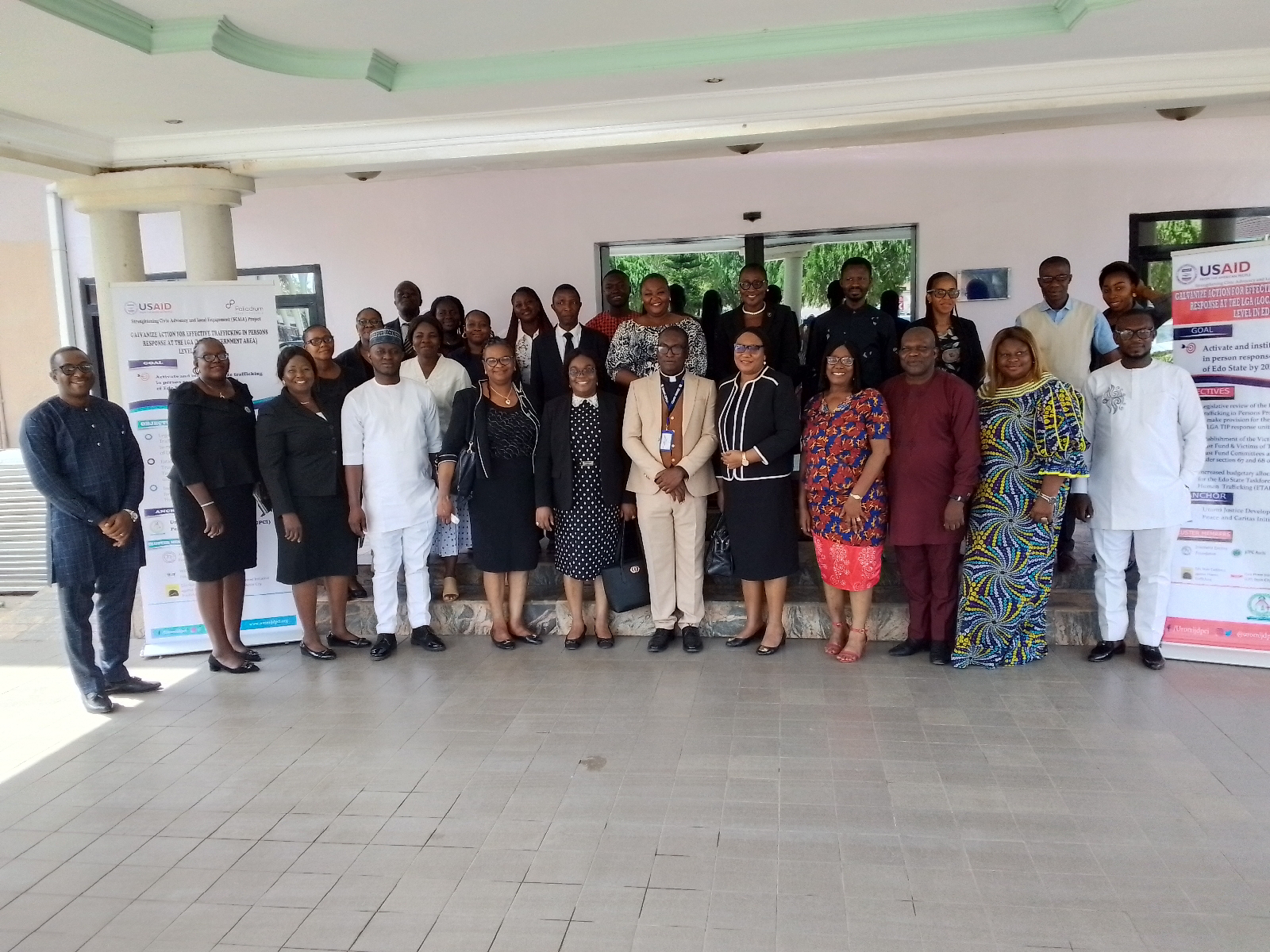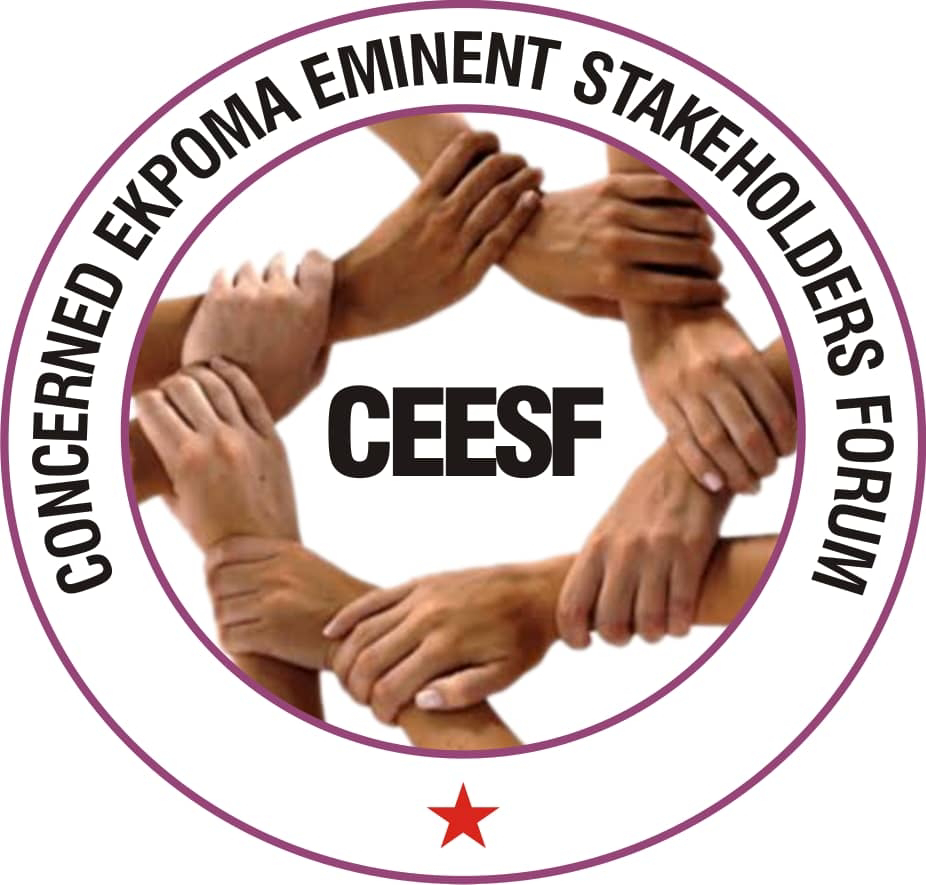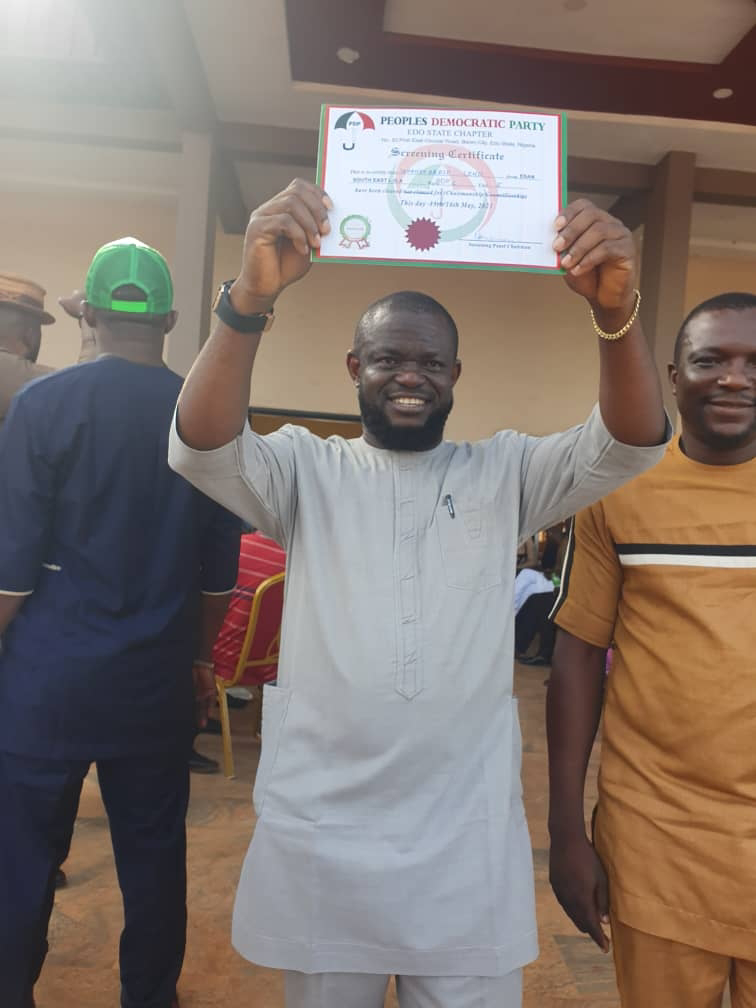Uromi JDPCI Engages Judges, Magistrates on Human Trafficking
By Lucky Isibor
The Justice Development and Peace Caritas Initiative (JDPCI) of the Catholic Diocese of Uromi has organised a consultative workshop for Judges and Magistrates in Edo State on the operationalisation of the Victims of Trafficking Trust Fund (VTTF) in Edo State in its bid to alleviate the plight of victims of trafficking.
Welcoming participants to the consultative workshop held in Benin on Tuesday, 18 April, the Executive Director of Uromi JDPCI, Rev Fr. Dr. Fidelis Arhedo, said the workshop organised by the Localizing Trafficking In Persons Response (LOTIP-R) cluster under the Strengthening Civic Advocacy and Local Engagement (SCALE) project being financed by the United States Agency for International Development (USAID) and implemented by Palladium.
Fr. Arhedo noted that the objectives of the interactive session with judicial officers was "to acquaint participants with the provisions of the Edo State Trafficking in Persons Law 2018 as it relates to the operationalization of the VTTF, to discuss the modality and necessity to the effective operationalization of VTTF in Edo State; to engage and obtain commitments of the Judiciary towards ensuring the effectiveness of the operationallization of VTTF in the state."
While stressing the overall goal of the project, Fr. Arhedo stated that the advocacy ask of the cluster is "Legislative review of the Edo State Trafficking in Persons Prohibition Law 2018 to make provision for the creation of Trafficking in Persons (TIP) response units at various Local Government Areas in Edo State, Activation of the Victims of Trafficking Trust Fund and Victims of Trafficking Trust Fund Committees as stipulated under sections 67 and 68 of the Edo State TIP Law 2018 to empower victims of human trafficking and address the inadequate service provision for survivors of human trafficking in Edo State and increase in budgetary allocation for the Edo State Taskforce Against Human Trafficking ETAHT. This is to improve the provision of protection and reintegration services to victims of human trafficking.
"To achieve these objectives, we are strategically engaging Lawmakers, the Executive Governor, LGA structures and relevant Ministries, Departments and Agencies (MDAs) concerned with the outlined objectives. This workshop forms one of such engagements under the advocacy ask designed by the project towards the attainment of the second objective."
In an opening remark, the Chief Judge of Edo State, Hon. Justice Joe Acha commended the Edo State government for the establishment of the Taskforce Against Human Trafficking ETAHT and appealed for more conscious efforts to do something for the citizens economically to stem the ugly trend.
While encouraging the Taskforce to bring more of the cases to court, the Chief Judge who was represented by the Head of Criminal Division of the Edo State Judiciary, Hon. Justice Efe Ikpomwoba noted that "Trafficking has become a bane in society and we can see a reduction, but people are still being trafficked. We know that if something doesn't happen with the economy, it's going to be a very difficult task for those that are trying their best to do what they're doing. So this thing really falls a lot on government, without their participation, without their conscious effort to do something for citizens, people will always want to migrate. We commend the government for the establishment of the Taskforce and I must say that the call for the establishment of this Taskforce at the grassroots is a very welcome call because most of these people being trafficked are actually in villages and rural areas. So it's necessary for us to have this Taskforce established in those places so that they can start the work .
The Social Protection Advisor of the USAID-Palladium Project, Mr. Eric Umoru who represented the USAID-Palladium Project commended Edo State government for its frontline role in the fight against human trafficking noting that a lot of efforts have gone into trafficking response in the state.
In his words, "Edo State continues to be a shinning light when it comes to trafficking response, they have shown a lot of policy and institutional commitment.
"Edo state was one of the first states that came up with trafficking in persons law and prior to that a lot of effort has gone into the trafficking response in the state. "And as a critical stakeholder, we are all aware that this is not something new, but there continue to be doubts here and there particularly with the effective implementation of the law.
"Part of what this project has done through the cluster led by the Uromi JDPCI is to really identify where those loopholes are and part of it is with the operationalisation of vitims of trafficking trust fund. This is not something new, this is something that has been in the law, as long as it was created, but there are a lot of question mark and that question mark goes to the root of victim protection and really supporting victims to take back their lives.
"We're having this meeting today because they've recognised that Judges Magistrates, Judicial Officers are very critical in ensuring that this comes to light, you're very critical to ensuring that this comes to light, you're very critical that this VTTF is operational because at the end of today if we have the committee in place, if we have all the other provisions in place and the right orders are not made in courts, then it becomes an exercise in futility".
The Commander of the Benin Zonal Command of the National Agency for the Prohibition of Trafficking in Persons (NAPTIP), Nduka Nwanwenne (Esq) in his remark noted that the cluster’s interface with Judges and Magistrates was apt and timely as there is the need to get the victims not only protected, but supported to be able to get on with their lives so that they'll not be retrafficked.
While noting that the government cannot do it all for the victims, Nwanwanne pointed out that the Victim of Trafficking Trust Fund if operationalised will go a long way in assisting the victims to overcome the psychological trauma they went through.
In a goodwill message, representative of Caritas Nigeria, Onomen Oriakhi (Esq) disclosed that Caritas Nigeria has supported over a thousand returnees socially and economically, adding that it has not been easy for them in terms of trauma, healing, recovery and starting up something for themselves pointing out that these underline the necessity for the VTTF and its operationalisation as contained in the law.
In a remark, Prof. Okokunre Eghafona of the Department of Sociology and Anthropology in the University of Benin, said she belongs to a study group in the University that has been engaged in researching into the different aspects of human trafficking. She said they carried out research on remittances disclosing that the findings shows that family members of those trafficked are not able to account for their remittances home adding that when they decide to come home or escape from captivity they will discover that their relatives use it for things to improve their own lives and once the remittances stop, they're unable to maintain whatever they've acquired.
On her part, the Secretary of Edo State Taskforce Against Human Trafficking ETAHT, Itohan Okungbowa (Esq) assured that the government is on its toes adding that the Edo State Trafficking in Persons Law is undergoing amendment with a view to inputing provisions for sustainability plan and make the Taskforce become a commission or an agency.
In an interactive session after the different presentations, the Judges and Magistrates assured of their commitments and urge the Taskforce to ensure they raise the relevant issues during court proceedings.




Comments
Post a Comment